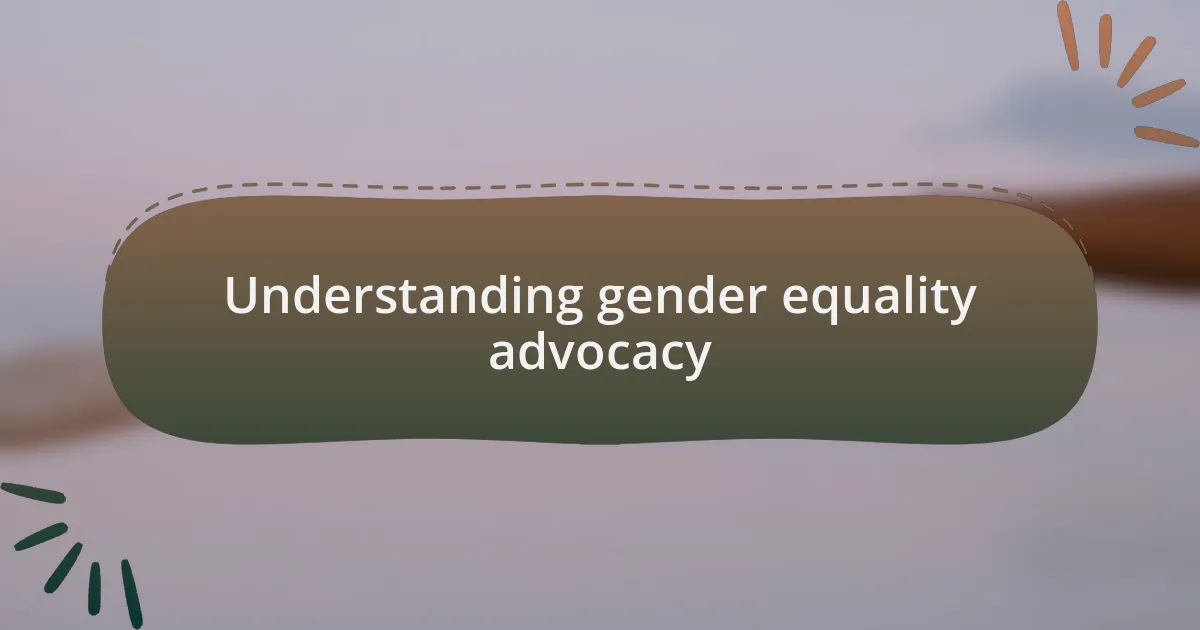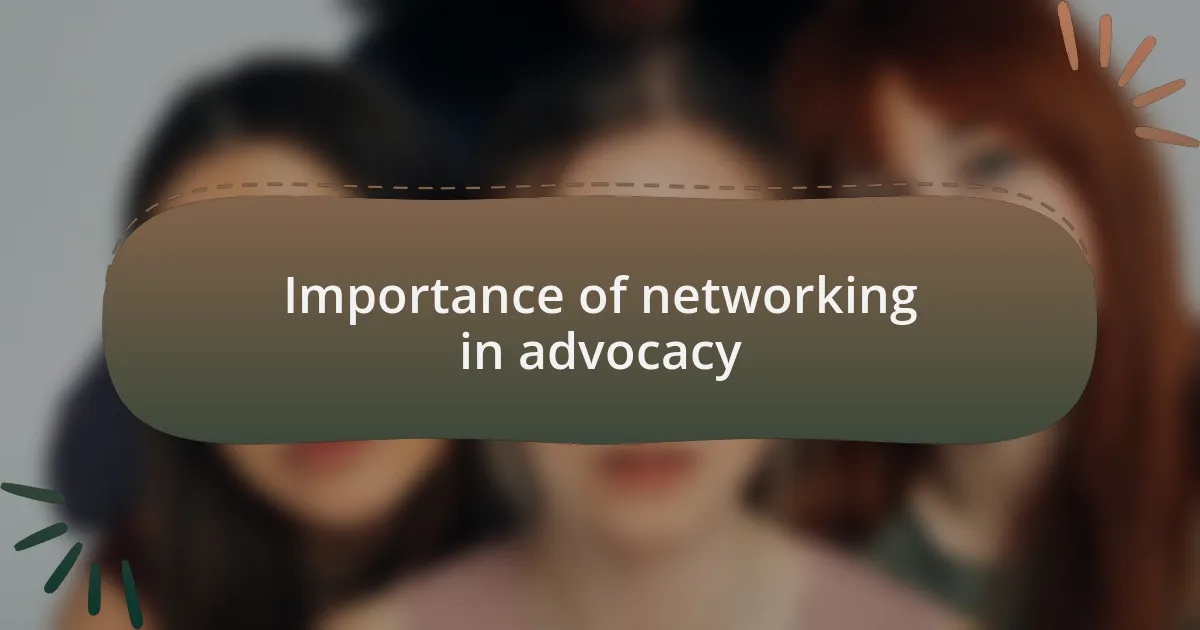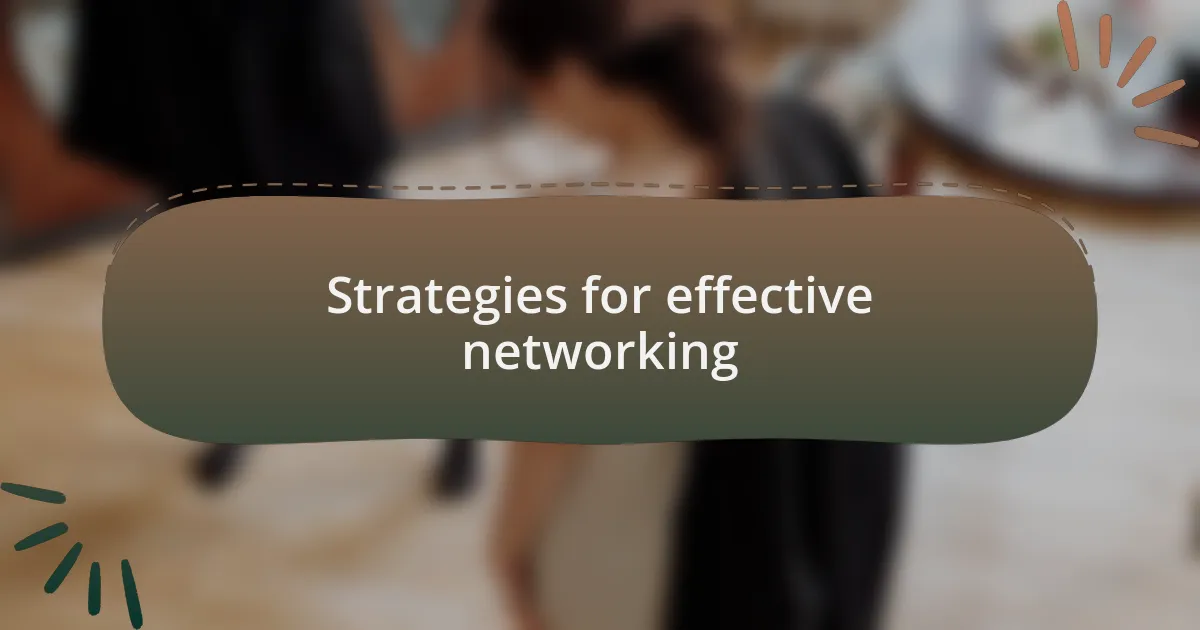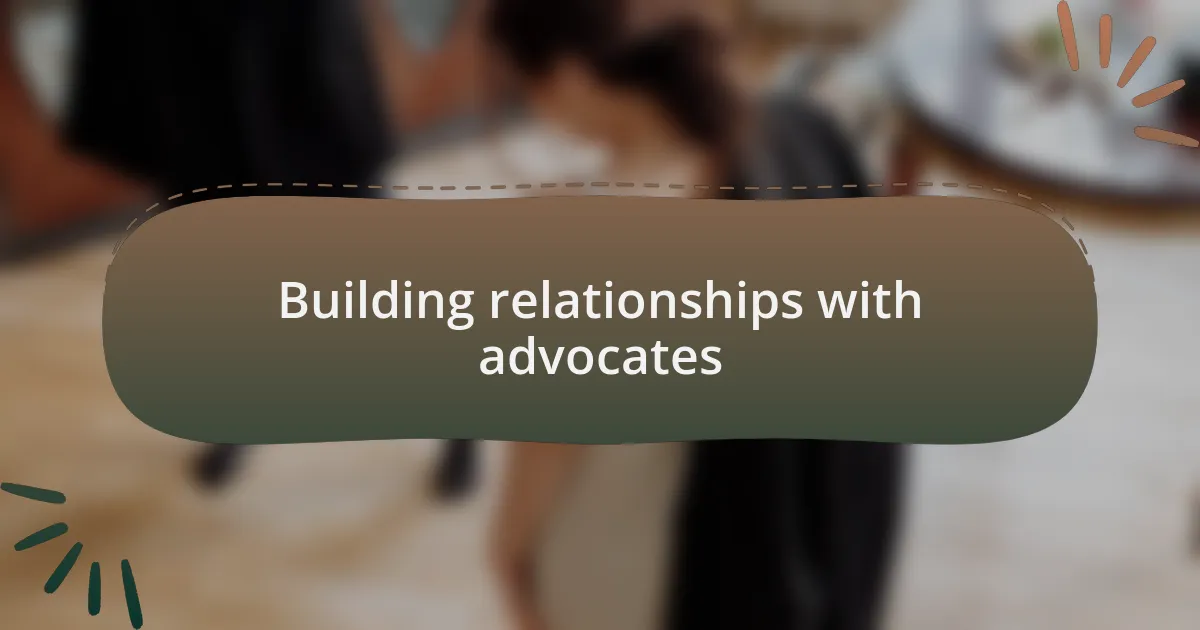Key takeaways:
- Gender equality advocacy is essential for creating equal opportunities and rights for all, highlighting a societal imperative rather than just a women’s issue.
- Networking is crucial in advocacy, as it builds trust, collaboration, and opens access to valuable resources.
- Authentic conversations and follow-ups are key strategies for effective networking, fostering lasting relationships and potential collaborations.
- Sustaining connections involves intentional efforts, such as celebrating milestones and sharing relevant resources to reinforce bonds.

Understanding gender equality advocacy
Gender equality advocacy is fundamentally about creating a world where everyone, regardless of gender, has equal opportunities and rights. I recall an event where a colleague shared her experience of facing gender bias in the workplace; it was a powerful reminder of how systemic barriers persist. It made me question: how many others are silently suffering under similar circumstances, and what can we do to elevate their voices?
To me, understanding gender equality advocacy means recognizing that it’s not just a women’s issue but a societal imperative. I’ve often engaged in discussions with friends who don’t see the direct impact on their lives, and it always strikes me how vital it is to share stories and statistics that reveal these connections. When we see the ripple effects of gender inequality in our communities, it helps foster a collective responsibility for change.
Moreover, advocacy involves actively dismantling the stereotypes that pigeonhole individuals based on their gender. I once volunteered at a workshop aimed at promoting STEM careers among young girls, and the enthusiasm in the room was contagious. It left me pondering: what if we all committed to challenging traditional norms in our daily lives? This shift in mindset, I believe, is essential for building a more equitable future.

Importance of networking in advocacy
Networking plays a pivotal role in advocacy, especially in the realm of gender equality. I’ve experienced firsthand how connecting with others can amplify our collective impact. For example, during a community meeting, I was able to share a project idea that blossomed through discussions with advocates from different backgrounds. Their diverse perspectives not only strengthened my proposal but also led to collaborative efforts that had far-reaching effects.
Building a strong network also builds trust and credibility among advocates. I remember attending a panel discussion where speakers shared their experiences in mobilizing grassroots movements. Their stories highlighted how personal connections often led to securing crucial funding and support. It made me realize that advocacy is less about individual achievements and more about the relationships we cultivate to drive genuine change.
Ultimately, effective networking opens doors to valuable resources and knowledge. I often reflect on how a simple introduction at a conference led me to a mentor who guided my advocacy journey. This experience demonstrated to me that every connection has the potential to create opportunities and further our mission for gender equality. Isn’t it fascinating how one conversation can inspire a ripple effect that extends far beyond our immediate circles?

Strategies for effective networking
Engaging in conversations is one of the most effective networking strategies I’ve found. When I attend events, I focus not just on handing out business cards, but on forming authentic connections. For instance, at a recent workshop, I struck up a dialogue with someone who shared my passion for gender advocacy. That conversation turned into a brainstorming session, leading to a joint project that combined our strengths. It’s incredible how meaningful discussions can lay the groundwork for impactful collaborations.
Another strategy that has served me well is to follow up after meeting someone. I make it a point to send a brief email within a few days, reflecting on our conversation and suggesting ways we might work together. I recall reaching out to a fellow advocate after a conference, and that single message led to a series of meetings where we explored joint initiatives. It reinforces the idea that networking doesn’t just happen in the moment; it’s about nurturing those relationships over time.
Don’t underestimate the power of social media either—it’s a modern tool that can connect like-minded individuals, regardless of geography. I remember posting about a gender equality campaign on my social profiles, and it sparked a flurry of connections with others who were passionate about the same issues. This interaction not only expanded my network but also provided new insights and support for my advocacy work. How many opportunities might we be missing if we don’t leverage these online platforms?

Building relationships with advocates
Building relationships with advocates requires a genuine investment of time and energy. I remember attending a small local meet-up where I had the chance to interact with an experienced advocate. Instead of racing through introductions, we took the time to share our personal journeys, which laid a solid foundation for mutual trust. Isn’t it amazing how opening up can turn a brief encounter into a lasting partnership?
Moreover, collaboration can blossom when we seek advice from our peers. I often find that asking for input on my projects invites a deeper connection. Recently, I reached out to an advocate whose work I admired, and by discussing my challenges, we not only brainstormed solutions but also discovered areas for collaboration. Have you ever noticed how these exchanges can bring a fresh perspective that reinvigorates your mission?
Finally, attending advocacy events with a mindset of giving can greatly enhance your relationships. When I volunteer my time or resources at events, it creates a natural bond with fellow advocates. I vividly recall a moment when I brought supplies to a workshop, and that act of kindness opened doors for future connections. Could it be that generosity in this space is the key to foster lasting relationships?

Personal experiences in networking
Networking within the advocacy realm has truly shaped my understanding of collaboration. I distinctly remember a panel discussion where the atmosphere was charged with passion. Afterward, I approached one of the speakers, and instead of merely exchanging business cards, we delved into our motivations for advocating. That depth of conversation left me feeling inspired and connected; it transformed a simple interaction into a potential partnership. Have you found that sharing your ‘why’ can foster a deeper connection with others?
Another memorable experience occurred at an international conference where I intentionally sought out individuals from different backgrounds. One woman I met had faced immense barriers in her own advocacy journey. Listening to her story not only broadened my perspective but also sparked a meaningful friendship. It reminded me how vital it is to step outside our comfort zones; sometimes, the best insights and partnerships can come from unexpected conversations. Have you ever found that stepping into unfamiliar territory rewards you in ways you hadn’t anticipated?
I often find that follow-ups are just as crucial as the initial meetings. After attending a workshop, I made it a point to send a personalized email to those I connected with. Reflecting on our discussions, I expressed my enthusiasm for future collaboration. Surprisingly, this simple gesture led to a collaborative project that brought together diverse voices in our field. How have your follow-ups influenced the growth of your professional network? In my experience, taking that extra step can unlock doors to new opportunities, emphasizing the importance of nurturing relationships over time.

Lessons learned from networking
Networking has taught me that vulnerability can be a powerful tool. During a small group session, I shared a challenge I faced in my advocacy work. To my surprise, others opened up about their struggles too. It was a profound moment, showing me that we’re not alone in our journeys. Have you noticed that sharing your challenges can create a supportive network where people genuinely want to help each other?
I also learned the value of listening more than speaking. At a recent networking event, I made a conscious effort to ask thoughtful questions and truly engage with others’ stories. This shift in focus resulted in some of the most enriching conversations I’ve ever had. It reinforced my belief that understanding others’ perspectives is key to creating meaningful alliances. How often do you find the best networking moments come from simply listening?
Moreover, I recognize that maintaining relationships goes beyond occasional check-ins. I once reached out to an acquaintance years after our initial meeting, just to see how their project was progressing. This gesture sparked a conversation that led to a collaborative initiative we co-hosted. It was a reminder that genuine interest in others fosters long-lasting connections. How do you keep the flames of your networks alive? In my experience, consistent communication can turn an acquaintance into an ally.

Tips for sustaining connections
Sustaining connections requires intentionality and a bit of creativity. I remember hosting a small coffee get-together for a few connections I hadn’t seen in a while. The simple act of bringing everyone together, even for a casual chat, reminded me how much those relationships mattered—and it sparked new discussions about our ongoing projects. Have you ever considered the impact of a relaxed gathering on your network?
Another tip is to recognize and celebrate milestones together. When a colleague recently launched a new initiative, I made it a point to send a congratulatory message that included a personal note about how their past advice had influenced my work. These gestures not only acknowledge accomplishments but also reinforce the bonds we’ve built. Have you thought about how your words can uplift and strengthen your professional relationships?
Finally, I’ve found that sharing relevant resources can be a great way to stay engaged. When I come across an article or event related to someone’s interests or projects, I make it a habit to pass it along. It shows that I’m thinking of them and values our connection. What resources have you shared recently with your network? This simple act can serve as a reminder that relationships thrive on mutual support and care.